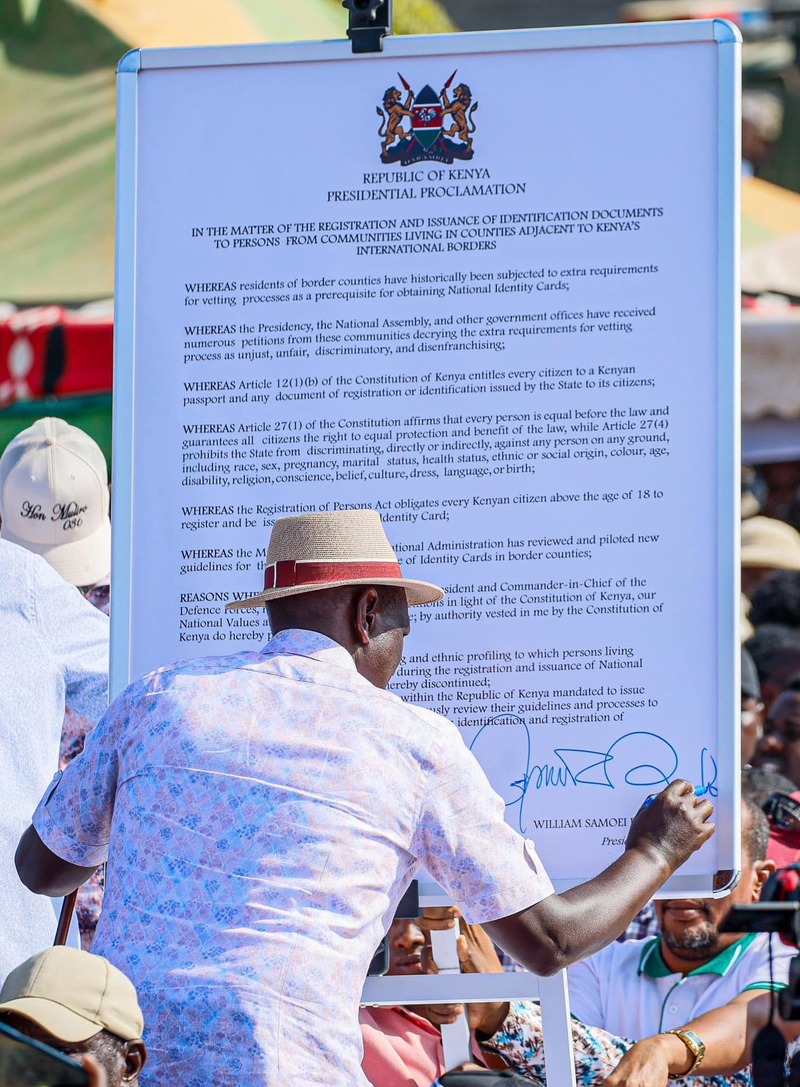Revealed: State to use biometrics, family tree for ID vetting in North Eastern

Murkomen said the family tree verification will trace an applicant’s lineage to confirm their Kenyan citizenship. The second measure involves equipping chiefs and assistant chiefs with electronic biometric devices to capture applicants' data digitally, improving accuracy and security.
Family tree verification, electronic biometric capture and school-based registration are among the three new measures that will be used during the vetting of national identification card applicants in North Eastern to enhance transparency, efficiency, and national security.
The State Department for Immigration and Citizen Services has introduced three new measures to streamline the vetting process for individuals seeking identification cards.
More To Read
- Murkomen warns politicians over hired goons, rising SGBV cases
- Tough decisions stabilised the economy, saved Kenya from shame – Ruto
- Ruto and Oburu strengthen UDA-ODM alliance after by-election win
- Ruto unveils Sh400 billion mega dam plan to turn North and Coast regions into Kenya's new food basket
- Ruto says 15,000 jobs on the horizon following launch of landmark highway expansion
- Ruto says Kenya can attain first-world status within three decades
The move follows President William Ruto’s decision to scrap the 60-year-old vetting requirement for ID applicants in border regions.
According to the department, the guidelines seek to ensure a transparent and efficient system for all applicants.
Interior Cabinet Secretary Kipchumba Murkomen said the guidelines aim to eliminate long-standing discrimination while ensuring that only legitimate applicants receive identification documents.
Murkomen said the family tree verification will trace an applicant’s lineage to confirm their Kenyan citizenship. The second measure involves equipping chiefs and assistant chiefs with electronic biometric devices to capture applicants' data digitally, improving accuracy and security.
The third guideline entails school-based registration, where teachers will assist in verifying genuine applicants.
“The ministry has developed guidelines on the vetting of applicants for IDs. This brings to an end the over 60-year discrimination Kenyans from Northern Kenya and other border counties have been subjected to,” Murkomen said.
“This has been done without compromising the integrity of our national security and sovereignty. We are not opening the doors for non-Kenyans to apply for Kenyan documents. That will not happen, and officials on the ground are aware.”
Murkomen further explained that the introduction of the Maisha Number project will reduce reliance on manual screening.
“With a Maisha Number, you are identified from birth, allowing us to access your complete bio-data, including information about your relatives. This makes manual vetting obsolete,” he added.
The Interior CS made the remarks after the conclusion of a two-day retreat for senior officials from the Interior and National Administration ministry in Naivasha. The retreat was held to assess midterm performance and strategize for improved service delivery.
“As we approach the midpoint of the administration in the process of realising our social contract with Kenyans, we have agreed on various deliverables and set targets for improved performance,” Murkomen said.
He highlighted the onboarding of over 20,000 services onto the E-Citizen platform with a single-pay bill, leading to increased revenue collection. He emphasised that this aligns with the government’s directive to digitise public services.
Other key achievements include the expedited processing and issuance of identification and travel documents, as well as certificates of good conduct
Top Stories Today












































